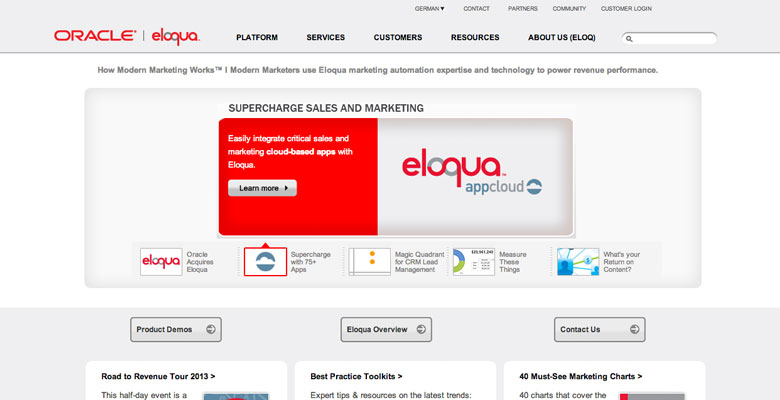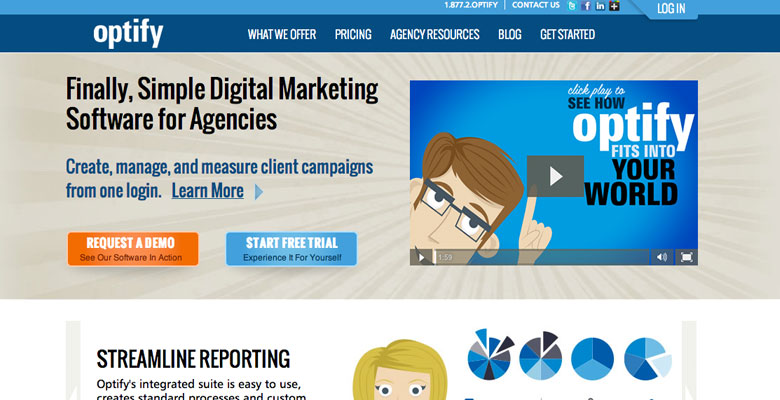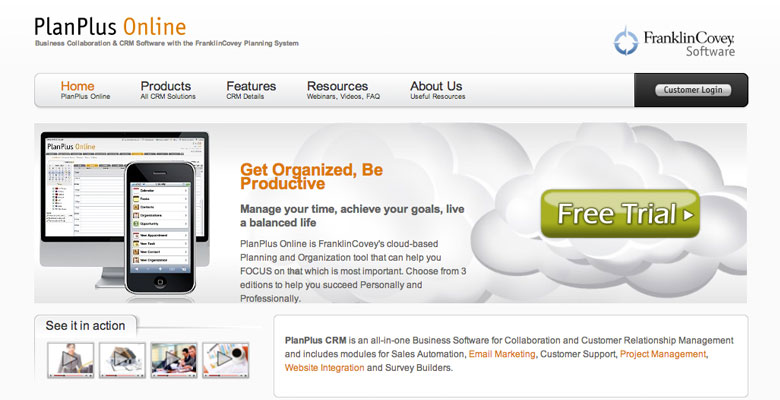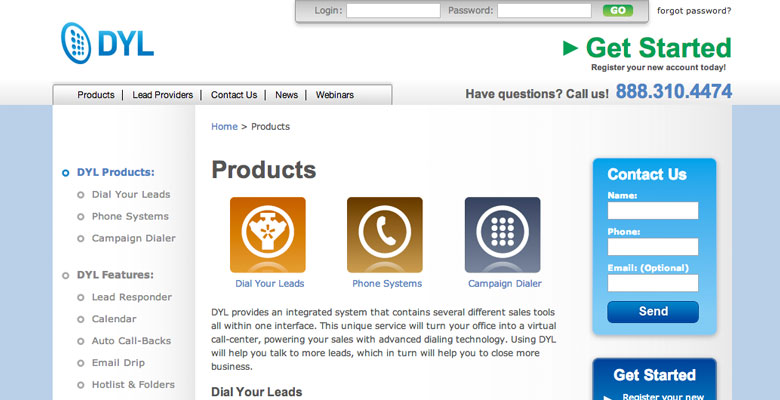What is marketing automation?
Marketing automation software is a great way to expand your marketing team’s capabilities and increase productivity. Despite their cost, marketing processes are great value for money and many companies see their investment returned in a matter of months, if not weeks. The value of these software solutions scales too, as they can be used by either lone-wolf Marketing Managers or entire enterprise-level marketing departments for effective marketing.
Marketing automation can take many shapes and forms including email marketing, automating repetitive tasks, automating marketing strategies, lead generation, sales funnels and customer experience.
Here are five great marketing automation tools that have made a significant impact on how modern companies promote their products, and how they can benefit you:
1. Eloqua

Considered a pioneer in marketing automation, Eloqua has been at the front of the pack for over ten years. They have over 1,100 clients worldwide over a dozen industries, including giants like McAfee, Sony, Siemens, DowJones, Johnson & Johnson, and even several NBA teams. One of our clients also deals with cloud software development and has a great brand identity.
Eloqua markets itself as a complete, all-in solution, and its features are remarkably comprehensive. Here’s a sampling of what Eloqua has to offer:
- Campaign automation. Eloqua allows marketers to automatically send emails when a customer meets certain pre-defined conditions like purchasing a product, signing up for an event, or reaching a renewal period.
- Targeted list generation. By using the information stored in your Eloqua database, you can create more qualified lists by setting customer behavior-centric criteria such as the last time they visited your site, email campaigns they responded to, and lead ratings.
- Database health reporting. Marketers can diagnose the health of their contacts database by how it’s growing or shrinking, how complete the records are, and the activity rates of all the segments.
Although Eloqua can be used by organizations of any size, its hefty price makes it most suited for mid- to large-sized organizations. Naturally, the lower you go, the less features you have. The lower-priced options do, however, have the option of individually buying additional features if the baseline setup is too limited for you.
2. Optify

Optify is a marketing automation tool focused on digital marketing and social media. It sells itself heavily to digital marketing agencies and B2B customers, and its services scale well no matter the size of the business—whether they have one website or 100. Optify releases regular reports on the health of the digital marketing agency and trends and has an extensive “resources” section for clients to educate themselves.
Notable features include:
- Optify Connect. This is a powerful user history tracking program that builds a thorough history of an individual prospect’s connection to you—even from sites that aren’t your own. It can track emails opened, referral links, and visits to your site over a period of months, and connect them all together to form a long-term picture of a customer’s browsing behavior.
- Marketing API. An online marketing database gives you instant, portable access to all the website data the Optify collects. It allows you to create custom dashboards and reports for easy reference, plus makes it easy for Optify to integrate with other marketing systems and CRM software.
- Social media software. One of Optify’s best strengths is the depth of its social media features. Not only can you schedule posts and announcements in advance, but you can also track leads, traffic, and conversions generated by each individual post. You can even create forms and landing pages on Facebook.
3. Hubspot

Hubspot has always been a strong performer, but their market presence has skyrocketed thanks in large part to their popular and acclaimed blog. The blog is a gold mine of inbound marketing tips, tricks, and insights, all delivered in a friendly and engaging style that draws readers in from all over the Internet. It is rather appropriate, given that one of Hubspot’s great strengths is its content marketing management features.
Features like:
- Blog content conversion analysis. Hubspot has its own blogging platform, which allows them to analyze which of your blog articles are generating the most leads and converting them into customers. Hubspot also gives you a helping hand by providing automatic SEO tips as you write your blog.
- Custom CTAs. The Hubspot software lets you segment visitors based on data and behavior, and lets you automatically switch to CTAs and offers that they would find interesting. You can even A/B test your CTAs in order to determine which is the most effective.
- Landing page manager. Hubspot allows you to create your own landing pages from scratch without learning HTML. It includes templates, metrics, and A/B testing already integrated so that marketers won’t have to hire expensive contractors to do that work piecemeal.
4. PlanPlus Online

PlanPlus Online, by FranklinCovey Software, was created especially for the real estate, insurance, and finance consultant industries, and has extensive features for business planning and project management in addition to the regular marketing automation tools. It also includes a CRM platform and means for capturing sales and marketing leads. But it’s organizational tools are where this product really shines:
- Calendar sharing. PlanPlus Online allows you to keep an online calendar of all your tasks and appointments, with options for color coding and additional details. But the innovative aspect of it is the ability to share calendars with your team. You can even make the calendar public and allow external users to check your schedule.
- Task management. PlanPlus Online allows users to schedule tasks on your calendar and prioritize them based on an alphanumerical rating system. Higher-level users can even delegate tasks to other people remotely—even people not on PlanPlus Online.
- Business process builder. Sales managers can design and implement sales workflow and methodologies on PlanPlus Online and use it to raise the general level of their sales team by sharing best practices. The editable workflows allow sales managers to identify performance issues and adapt to them quickly.
5. DYL Lead Advantage

DYL is a hybrid sales/marketing system that merges their functions and allows the two departments to work seamlessly with each other. It uses an email and direct marketing lead management system as well as generates automated calls or follow-ups that make marketing more effective.
- Instant lead responder. This innovative system allows sales staff to contact an incoming lead seconds after the lead comes in. As soon as the lead is entered into the system—via email, submission form, or otherwise—it gets forwarded to the sales rep as an incoming call. Leads can therefore be contacted moments after they submit their information, which is when they’ll be most receptive to your call.
- Email drip. This feature automatically sends periodic marketing emails to prospects at times of your choosing. Not only that, but leads can click on a link that triggers the Instant Lead Responder feature mentioned above, initiating a call between your sales staff and the prospect.
- Campaign dialer. DYL also offers a user-friendly campaign dialer that eliminates delays between calls. Instead of having to hang up, pick up the phone, and physically dial a number, sales reps can now initiate a call by clicking on a number on their screen. The system also scrubs uploaded lists against the National Do Not Call List, minimizing both risk and effort.
Have you ever used any of the software mentioned above? Comment below and share a review!
